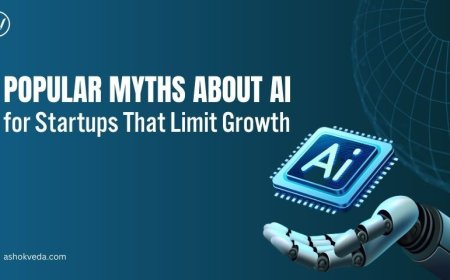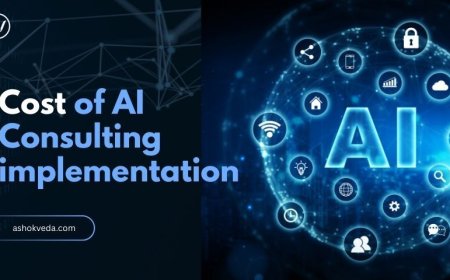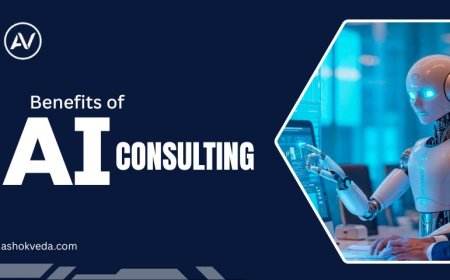What is AI for Startups? Tips for Growth and Innovation
Discover what AI for startups means in 2025. Learn how AI transforms operations, decision-making, customer experience, and product innovation.
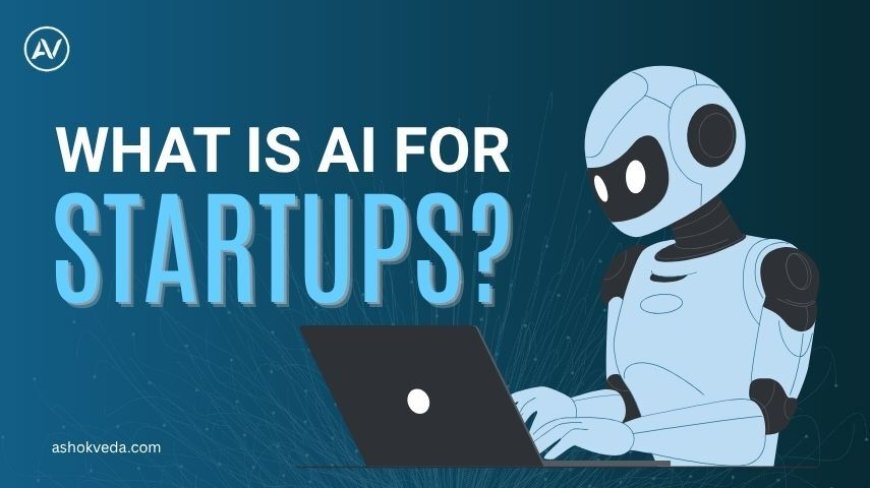
Artificial Intelligence (AI) has become the secret weapon for startups looking to innovate, scale, and outpace competition. The global AI market is projected to exceed $757 billion, and startups are increasingly leveraging AI not just to automate tasks, but to transform entire business models. From predicting customer behavior and streamlining operations to delivering hyper-personalized experiences, AI empowers startups to make smarter, faster decisions with limited resources.
But what exactly does “AI for startups” mean, and how can young companies harness it to achieve rapid growth? AI is no longer a luxury reserved for tech giants; it’s an accessible, transformative tool that startups of any size can leverage. From AI-powered analytics to smart automation and generative tools, the possibilities are endless
Understanding AI in the Startup Context
At its core, AI refers to computer systems designed to perform tasks that normally require human intelligence. This includes tasks such as decision-making, problem-solving, learning from data, and understanding natural language. For startups, AI isn’t just a tool for efficiency; it’s a strategic partner that can help create new business models and disrupt traditional markets.
AI for startups encompasses various technologies:
-
Machine Learning (ML): Systems that learn from data and improve over time.
-
Natural Language Processing (NLP): Enables machines to understand and interact in human language.
-
Computer Vision: Allows computers to interpret visual data from the environment.
-
Robotic Process Automation (RPA): Automates repetitive tasks for operational efficiency.
-
Predictive Analytics: Helps startups anticipate trends, behavior, and risks.
Why AI Matters for Startups in 2025
The adoption of AI by startups has accelerated significantly in the past few years. According to McKinsey’s 2025 AI report, over 78% of organizations now deploy AI in at least one business function, with startups leading the charge in creative applications of the technology.
Several factors make AI essential for startups:
-
Resource Efficiency: Startups often operate with limited resources. AI allows automation of routine tasks like customer support, data entry, and logistics, freeing human capital for strategic growth.
-
Data-Driven Decision Making: Startups can make smarter, faster decisions by leveraging AI analytics. Predictive algorithms help forecast customer behavior, demand trends, and market shifts.
-
Hyper-Personalization: AI enables startups to tailor experiences to individual users, creating unique value propositions and fostering stronger customer loyalty.
-
Speed to Market: AI accelerates product development cycles through simulations, rapid prototyping, and automated testing.
How Startups Are Using AI Today
1. Streamlining Operations
For startups, every minute and every resource counts. AI-driven automation is a game-changer, helping lean teams reduce operational overhead while maximizing efficiency.
-
Customer Support Chatbots: AI-powered chatbots can handle inquiries around the clock, instantly addressing repetitive questions and allowing human teams to focus on complex or high-value issues.
-
Inventory Management: AI predicts demand and stock requirements, minimizing the risk of shortages or overstocking, and ensuring smoother supply chain operations.
-
Finance Automation: From bookkeeping and invoicing to fraud detection, AI tools streamline financial operations, saving time and reducing errors.
Example: Startups like Zeta AI leverage AI to automate payroll and HR workflows, cutting administrative workloads by up to 60% and freeing teams to focus on growth and innovation.
2. Enhancing Decision-Making
In today’s fast-paced and unpredictable markets, startups need to make quick, informed decisions to stay ahead. AI provides real-time insights from vast datasets, enabling founders to act with confidence and precision.
-
Predictive Analytics: AI forecasts demand trends, customer behavior, and market shifts, helping startups anticipate opportunities and challenges.
-
Market Research: By analyzing competitor strategies, industry trends, and customer feedback, AI delivers actionable intelligence that informs strategic planning.
-
Risk Assessment: AI identifies potential operational, financial, or compliance risks before they escalate, allowing startups to proactively mitigate threats.
Example: Platforms like DataRobot empower startups to build predictive models without requiring deep technical expertise, giving teams the ability to leverage advanced analytics for smarter, faster decision-making.
3. Personalizing Customer Experiences
In an era where customer expectations are higher than ever, startups need to stand out by offering personalized experiences at scale. AI enables companies to understand individual preferences and behavior, turning data into meaningful interactions.
-
Targeted Marketing: AI segments audiences based on behavior, preferences, and engagement patterns, boosting conversion rates and campaign effectiveness.
-
Product Recommendations: AI-powered platforms suggest products tailored to each user’s activity and interests, enhancing relevance and driving sales.
-
Dynamic Content Creation: AI generates personalized emails, messages, ads, and other content, ensuring each interaction feels uniquely crafted.
Example: Retail startup Shopora leverages AI to deliver individualized shopping recommendations, resulting in a 25% increase in average order value and stronger customer loyalty.
4. Accelerating Product Innovation
AI isn’t just a tool for operational efficiency—it’s a catalyst for groundbreaking product development. Startups can leverage AI to innovate faster, iterate smarter, and bring products to market with unprecedented speed.
-
Design Assistance: AI tools like ChatGPT and DALL·E help generate design concepts, wireframes, or even code snippets, reducing development time and sparking creative solutions.
-
Testing & Quality Assurance: AI predicts software bugs, product flaws, or performance issues before launch, ensuring higher-quality releases and reducing costly errors.
-
Market Fit Analysis: By analyzing customer feedback, social trends, and usage patterns, AI guides startups in refining products to meet real-world demand.
Example: Health-tech startup MedAI uses AI to accelerate drug discovery, cutting research cycles from years to just months and enabling faster delivery of life-changing solutions.
Overcoming AI Challenges for Startups
While AI offers enormous benefits, startups face several challenges when implementing it:
-
Data Privacy and Compliance: Handling user data responsibly is critical. Compliance with GDPR, CCPA, and other regulations is non-negotiable.
-
Talent Shortage: AI expertise is in high demand, making hiring skilled professionals challenging for startups.
-
Cost of Implementation: Although AI tools are more accessible today, initial setup costs can be a barrier.
-
Integration Complexity: Incorporating AI into existing workflows requires careful planning to avoid disruption.
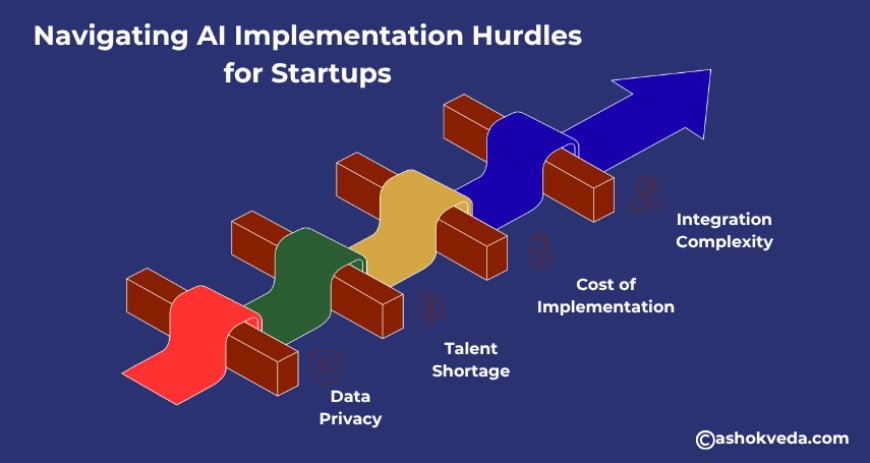
Strategies to Overcome These Challenges:
-
Use AI-as-a-Service: Cloud-based AI platforms reduce infrastructure costs and simplify deployment.
-
Start Small: Implement AI in specific areas first to demonstrate ROI.
-
Upskill Teams: Invest in AI training for existing employees rather than relying solely on external hires.
-
Focus on Ethical AI: Build AI systems that are transparent, unbiased, and accountable.
The Future of AI in Startups
As we look beyond 2025, AI is set to reshape startup ecosystems even further:
-
AI-Driven Market Innovation: Startups will increasingly use AI to create entirely new markets and business models.
-
Collaborative AI Systems: Partnerships with enterprises and research institutions will allow startups to leverage cutting-edge AI research.
-
Ethical and Explainable AI: Stakeholders will demand transparency, fairness, and accountability in AI systems.
-
AI-Powered Creativity: From generative design to automated storytelling, AI will amplify human creativity in startups.
So, what is AI for startups? It is a catalyst for growth, innovation, and operational excellence. From streamlining day-to-day tasks to predicting market trends and creating personalized experiences, AI empowers startups to compete with larger, established companies. However, the journey requires thoughtful planning: addressing data privacy, investing in talent, and starting small. Startups that embrace AI strategically will not just survive—they will thrive, innovate, and lead the market. In 2025 and beyond, AI is the engine driving startup success. The question is not whether you should use AI, but how quickly you can integrate it to stay ahead in a fast-paced, competitive world.

























